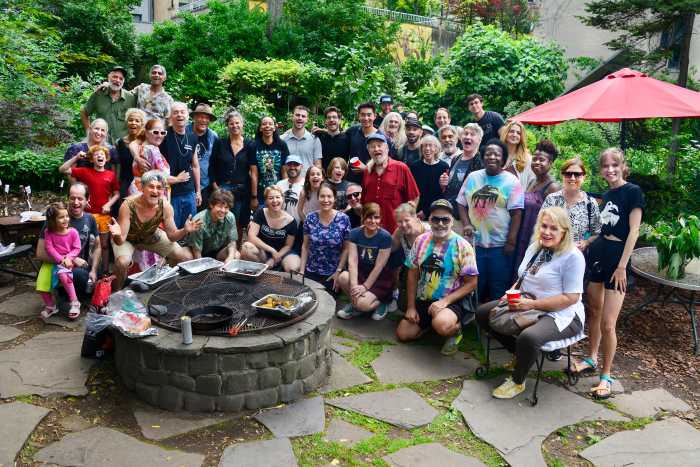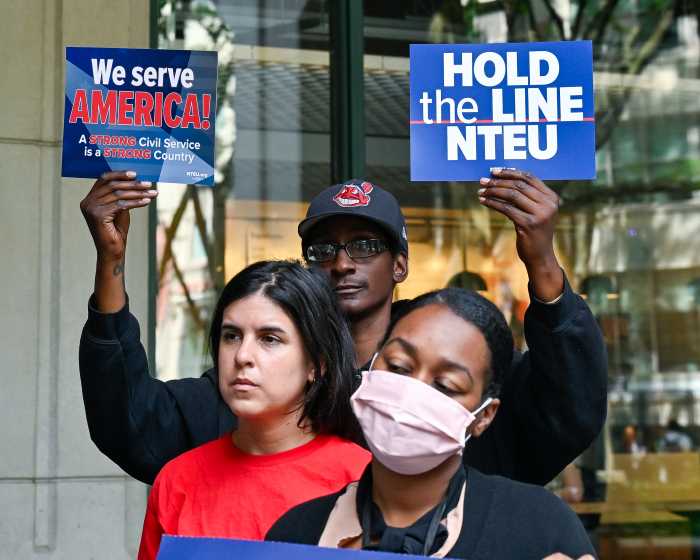By Keith Crandell
Upset about the Great New Jersey Bear Hunt, the first since 1970? Blame Osama bin Laden. The six-day bear hunt came to a close on Dec. 13 with 328 bears dead. The bear fatalities included not just 500-pound male behemoths, which were in the distinct minority. The kill included a goodly number of cubs and their mothers. Females accounted for about two-thirds of the dead bears. How many were wounded? The state does not keep records, but it is obvious that an injured bear in pain is likely to be more dangerous than a healthy bear.
Jean Zipser, whose closest neighbors are bears, is upset beyond all telling. Jean used to be a baker on the Lower East Side, was formerly married to an editor of The Villager, the journalist and poet Mark Dante Cottone, and was formerly the mayor of a small New Jersey hamlet, Pahaquarry Township. She now lives in a thick-walled 18th-century farmhouse built by a Dutch settler named Abraham Van Campen in 1725. Jean’s parents bought the house in the 20th century and my wife and I were married in the Van Campen yard.
The Van Campen farmstead is in the heart of Bear Hunt country; it is on Old Mine Road, one of America’s oldest roads, an easy stroll from the Delaware River. The property and Jean Zipser’s historic home and what little was left of Pahaquarry Township are now part of the Delaware Water Gap National Recreation Area, a national park. Animal welfare groups fought vigorously to keep the hunters out of the park, but the New Jersey Supreme Court decided for the hunters. So for six days in early December, the usually bucolic scene out Jean’s kitchen window was speckled by gun-toting hunters, loaded for bear.
How, you may wonder, does this involve Osama bin Laden? Are those dudes with guns wandering along Old Mine Road part of some terrorist organization? Not really. They’re just so-called sportsmen out to kill some bears. Big bears, male bears, female bears, bear cubs. Makes no difference. The state wants them dead, and these gunmen are happy to oblige.
Here’s the Osama connection. After the horrendous events of 9/11, a significant number of people from New York City began fleeing to new residential developments in northwest New Jersey and eastern Pennsylvania, to what had been heavily wooded areas with some farming and a sprinkling of small hamlets. Many of them, according to Jean, were apprehensive about continuing to live in the city. They found that they could get much more house for the buck out in exurbia. Plenty of space for the kids. Country living!
“The trouble is,” said Jean last week, “that they don’t understand country living. The idea of co-existing with black bears is a totally alien concept to people who have spent their lives on a quiet street in Elmhurst.
“Bears,” she says, “are not your cute little friends. They are wild, hungry animals who spend much of their days foraging. They eat opportunistically; if you create a food opportunity for them they’ll accept it.”
Jean knows bears.
“My nearest neighbor is a female black bear with two yearling cubs,” she says. “My next nearest neighbor is one of her older offspring — a shy black bear with small round ears. Another neighbor is a large male who passes through my yard about once a month. These bears do not attack my domestic animals nor do they rummage through the garbage or destroy my sheds. They steer clear of my house and barn.
“I don’t believe they like the smell of humans. They’d just as soon leave us alone,” Jean continues. “I try not to give them any reason to like me. I don’t leave garbage out overnight. I don’t leave food out for the deer or for the birds. I feed my pets indoors. For 20 years, I’ve managed to live with bears all around me. We’ve co-existed.”
But following 9/11, she observes, careless new exurbanites arrived, leaving garbage cans out, spreading cracked corn for the deer and wild turkey, leaving suet out for the birds. And lo! They were startled to find bears ripping at their screen doors. Not only startled but frightened. They demanded protection from their local legislators. So when the hunters’ lobby demanded an open season on bears, the legislators found it politically easy to acquiesce.
And the new dwellers keep coming. Many of them take the bus from Stroudsberg to Manhattan, boarding as early as 4:50 a.m. and arriving sleepily at the 42nd St. bus terminal at 6:30. The schedule is brutal but those who want the country life for their families are willing to undergo it.
The trouble is that as the new country dwellers mushroom into the Poconos and into Warren and Sussex counties in New Jersey, they are in the process of destroying the country life they have sacrificed so much to enjoy.
The notion of New Jersey as a place of bucolic charm may seem bizarre to people whose view of the state is based on the snarl of highways west of the Hudson, and on the rough old neighborhoods of Jersey City and Hoboken and Newark. But believe me, the region in which the Great Bear Hunt took place is indeed a place of bucolic charm. Back of Jean’s place, hikers en route from Maine to Georgia on the Appalachin Trail struggle along Kittatinny Ridge, a rocky and difficult part of the trail. The nearest settlements, Blairstown, on the New Jersey side of the Delaware, and Delaware Water Gap, just across the bridge on the Pennsylvania side, are charming towns with sturdy 19th-century buildings.
On ancient Old Mine Road, nothing much has happened since the old mines closed, the Copper Mine Inn shut down and drivers drove incautiously, and smacked into one of the many deer that are everywhere, especially at dusk.
But now, pavers are widening the historic, old two-lane road to make way for the extra traffic caused by the onslaught of development. Near Blairstown and the Gap, builders erect ranch houses where once dairy cows grazed and small farms prospered.
The newcomers keep coming. Perhaps each new family should receive, in addition to its deed, instructions on living in the country, on how to be a good neighbor to the wild creatures they’ll encounter. Otherwise, hundreds of bears will be slaughtered every year until someone scratches his head a decade from now and says, “Remember bears?”
Read More: https://www.amny.com/news/funny-what-happens-with-childhood-best-friends/





































